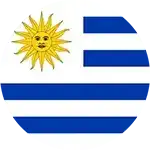Uruguay
-- Oriental Republic of Uruguay --
Uruguay officially the Oriental Republic of Uruguay or the Eastern Republic of Uruguay or the Republic East of the Uruguay is a country in the southeastern region of South America. It is bordered by Argentina to its west and Brazil to its north and east, with the Atlantic Ocean to the south and southeast. Uruguay is home to 3.3 million people, of whom 1.8 million live in the metropolitan area of its capital and largest city, Montevideo. With an area of approximately 176,000 square kilometres (68,000 sq mi), Uruguay is geographically the second-smallest nation in South America after Suriname. The only documented inhabitants of Uruguay before European colonization of the area were the Charrúa, a small tribe driven south by the Guaraní of Paraguay. In 2004, Uruguayans elected Tabaré Vázquez as president, while giving the Broad Front a majority in both houses of Parliament. Vázquez stuck to economic orthodoxy. As commodity prices soared and the economy recovered from recession, he tripled foreign investment, cut poverty and unemployment, cut public debt from 79% of GDP to 60%, and kept inflation steady. In 2009, José Mujica, a former left-wing militant who spent almost 15 years in prison during the country's military rule, emerged as the new President as the Broad Front won the election for a second time. In 2012, abortion was legalized. In 2013, same-sex marriage and cannabis were legalized.
-- Economy --
Economy of Uruguay is characterized by an export-oriented agricultural sector and a well-educated work force,along with high levels of social spending. After averaging growth of 5% annually during 1996-98, in 1999-2002 the economy suffered a major downturn, stemming largely from the spillover effects of the economic problems of its large neighbors, Argentina and Brazil. In 2001-02, Argentine citizens made massive withdrawals of dollars deposited in Uruguayan banks after bank deposits in Argentina were frozen, which led to a plunge in the Uruguayan peso, a banking crisis, and a sharp economic contraction. Specialties of Uruguay
• Cattle were introduced to Uruguay before its independence by Hernando Arias de Saavedra, the Spanish Governor of Buenos Aires in 1603. Beef exports in 2006 amounted to around 37% of Uruguayan exports.
• Wool is a traditional product exported mainly to America, followed by the UK and India.
• Milk and dairy products. Conaprole, National Cooperative of Milk Producers is the main exporter of dairy products in Latin America (in 2006). The area of the country dedicated to the dairy food is located mainly in the south west.
• Rice. Fine varieties are produced in the lowlands in the east of the country close to Merin lake on the Uruguay-Brazil border. The national company Saman claims to be the main exporter in Latin America. Countries it exports to include Brazil, Iran, Peru, South Africa, Chile, Senegal, Argentina, Paraguay, Bolivia, Ecuador, USA, Canada and China.
-- Politics --
Uruguay is a representative democratic republic with a presidential system. The members of government are elected for a five-year term by a suffrage system. Uruguay is a unitary state: justice, education, health, security, foreign policy and defense are all administered nationwide. The Executive Power is exercised by the president and a cabinet of 13 ministers. The legislative power is constituted by the General Assembly, composed of two chambers: the Chamber of Deputies, consisting of 99 members representing the 19 departments, elected based on proportional representation; and the Chamber of Senators, consisting of 31 members, 30 of whom are elected for a five-year term by proportional representation and the Vice-President, who presides over the chamber. Uruguay is divided into 19 departments whose local administrations replicate the division of the executive and legislative powers. Each department elects its own authorities through a universal suffrage system. The departmental executive authority resides in a superintendent and the legislative authority in a departmental board.
-- Trade in Uruguay --
Major exports of Uruguay : Soya beans (10%), Bovine meat (frozen) (10%), Chemical woodpulp, soda or sulfate, not dissolving grade (8%), Rice (4%), Wheat and meslin (4%)
Major imports of Uruguay : Soya beans (9%), Cars (4%), Motor vehicles for transporting goods (2%), Automatic data processing machines (2%), Petroleum oils, crude (2%)
Major trade partners of Uruguay (Exports) : Brazil (20%), China (14%), Argentina (8%), Germany (7%), Venezuela (4%)
Major trade partners of Uruguay (Imports) : Argentina (18%), Brazil (17%), China (17%), Paraguay (11%), United States (6%)


